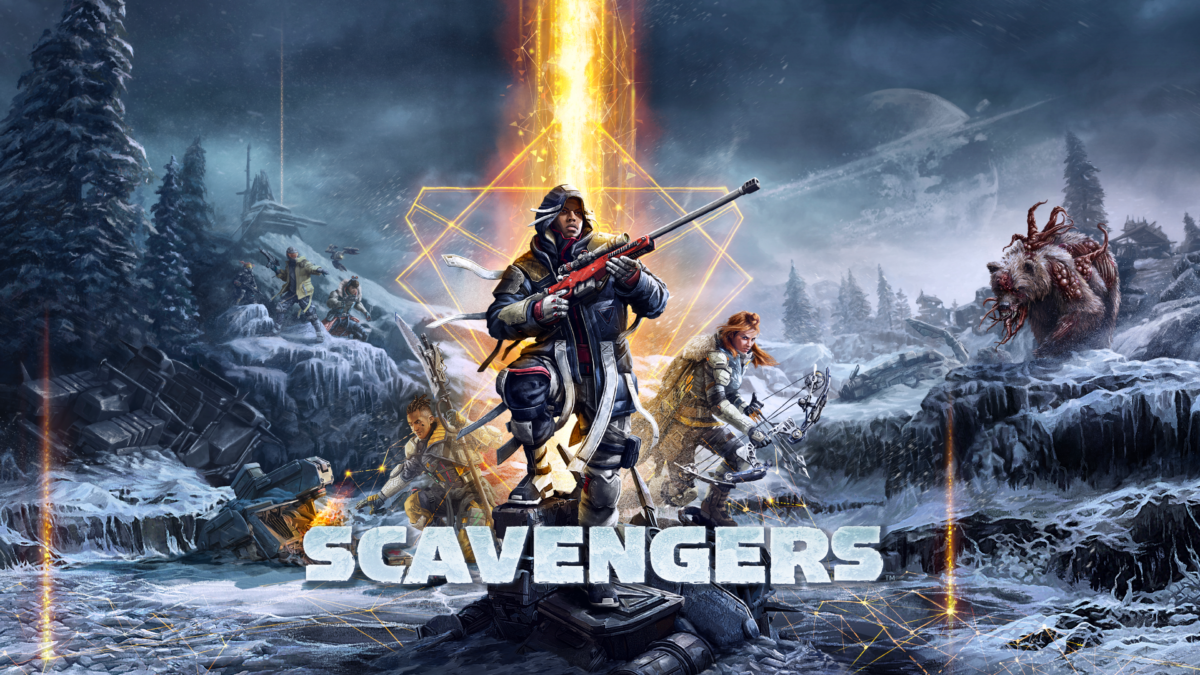
Virtual world technology company helps its US game studio to host thousands of players simultaneously in ScavLab, in an experimental, large-scale public event
London – June 1, 2021 – Games studio Midwinter Entertainment successfully hosted a peak of 4,144 players in a single, dense world during a community event for fans of the studio’s new game, Scavengers on Saturday, May 29. This experimental live event, which represents a major step for large-scale shared virtual worlds, was made possible by technology from Midwinter’s parent company, Improbable.
ScavLab, the experimental sandbox testing platform and game mode built into Scavengers, successfully hosted the players in its first public, massive “Winter Sports” player event, taking place in a shared real-time environment with realistic game physics, 3D models, and smooth performance as players slid down mountain passes and fought crowds of AI-controlled monsters.
This was the first time ScavLab has been open to any player who has downloaded Scavengers – a previous test in April combined 1800 humans, including some invited Scavengers community members, with several thousand simulated players.
Future ScavLab events will experiment with greater player numbers and player density, and introduce different gameplay elements for players to experience at scale.
This event marks not only a significant technological achievement, by providing a live game event – containing thousands of real players, joining across the world – with unprecedented density and fidelity, but is also a significant step forward in the development of the metaverse and virtual social spaces.
Technological innovation for virtual worlds
Creating dense, populated game worlds where every player can see and interact with every other player, with the quality and fidelity familiar to players from action games poses a unique series of challenges: because every player is visible to every other player, a tenfold increase in player numbers causes a significantly greater than tenfold increase in complexity.
As a result, in order to deliver an experience like ScavLab, innovations need to be made across the entire stack of online games technology, from the networking itself, through rendering the huge numbers of characters on screen, simulating the game world and scaling the server infrastructure.
The technology behind ScavLab, and ScavLab itself, were created through a collaboration between Improbable’s innovative game technology and the creative and technical contribution of both Improbable’s UK game studio and Midwinter Entertainment, the makers of Scavengers.
The difficulty of hosting large numbers of connected users in a single space, providing density and intimacy, has been a barrier to recreating a range of social experiences online. The technology behind ScavLab, initially developed by Improbable as an experiment in creating a “virtual town hall” for Improbable during the COVID-19 lockdown, represents a major step towards resolving the issue of density and intimacy at scale, and towards new possibilities for experiences in online worlds.
“First and foremost, we’re excited by the ways the team at Midwinter Entertainment are taking this technology and using it to build unique experiences for the Scavengers community,” says Rob Whitehead, Chief Product Officer and co-founder of Improbable.
“However, putting thousands of people together in a virtual world – truly together, rather than spread out over a huge map or distributed in smaller groups across many identical worlds – opens up exciting new possibilities not only for the future of multiplayer gaming, but for applications beyond current games.
“The density and sense of community that we take for granted at parties, musical performances or sports events is hugely challenging to recreate in a virtual world. We’re only starting to explore the technology and its possibilities, but ScavLab is a significant step along the path to a new range of ‘metaversal’ experiences.”
Midwinter Entertainment’s strategic survival shooter Scavengers is available in Early Access on Steam and the Epic Games Store.
—
About Midwinter Entertainment
Midwinter is a new Washington-based video game development studio established by veterans of the Halo, Battlefield, and Battlefront franchises, among many others. Josh Holmes, Fredrik Persson, Daryl Anselmo, and Peter Burzynski co-founded the studio after successful careers in AAA gaming. Holmes most recently served as Creative Director of Halo 4 and Studio Head of 343 Industries during the making of Halo 5: Guardians. Midwinter was acquired by Improbable in September 2019. For more information, please visit www.midwinter.net.
About Improbable
Improbable provides better ways to make multiplayer games, and helps multiplayer developers to meet any challenge. Designed specifically for game developers, Improbable’s services include managed hosting & orchestration, networking, online services, and development tools, as well as advice, support and full co-development.
Improbable also makes innovative multiplayer titles using its own technology, with studios in Canada, the US and Britain. The first game from Improbable Game Studios, Midwinter Entertainment’s Scavengers is available in Early Access on Steam and the Epic Games Store.
Founded in 2012 and headquartered in London, Improbable employs more than 900 staff in Europe, China and North America.
About Improbable Multiplayer Services
Improbable Multiplayer Services (IMS) is the new name for Improbable’s ever-expanding ecosystem of technologies and services dedicated to optimising the development, operation and evolution of online multiplayer games in the games-as-a-service (GaaS) space.
By combining proven technologies with access to a unique range of multiplayer game development skills and experience, IMS provides game makers with tailored and optimised solutions to the technical challenges associated with developing and operating live service games.
By using multiplayer services optimised by experts, game makers can develop and operate their games more effectively, and by using IMS to handle services developers and players rely on but shouldn’t notice, game makers can focus more of their time on making content.